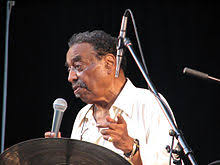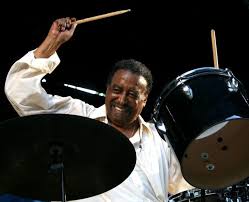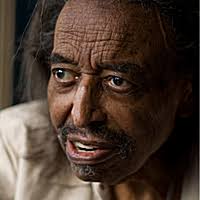A few years ago when I served as coordinator of the former NEA Jazz Masters on Tour program, which through the National Endowment for the Arts was an Arts Midwest operated fee support program which partially funded presenting organizations to present NEA Jazz Masters, one of the real revelations of the work was conducting several site visits on the subsequent funded projects; and that was in part because it enabled me the opportunity to interact with the Master in question, including conducting interviews. One such trip took me to Ft. Lauderdale, FL to visit a short residency by the great drum master, the now-ancestor Chico Hamilton. Chico had for many years taught at the New School so he was guaranteed to drop some wisdom on students during the masterclass that was a part of his visit to Ft. Lauderdale. If you ever saw Chico perform you remember certain specificities of his set-up, particularly how he set his cymbals lower than most drummers – a set-up he attributed to his desire for economy of motion. We spoke at Chico’s hotel room following his masterclass, where he discussed a drummer’s responsibilities and overall rhythm section concerns. There’s plenty of wisdom here, certainly for drummers!
Chico Hamilton
10/10/06 Fort Lauderdale, FL
NEA Jazz Masters on Tour

How did you begin your masterclass today?
By being smart [laughs]. I generally start off with the most important thing, which #1 is time. Unfortunately you find that most young musicians – particularly the beginners – have no idea of the life of a note; in other words how long a whole note is, how short a quarter note is, or how long a half note or a dotted half note is. Also the most important thing is being able to concentrate, which is not easy for anybody. Teaching them how to count – its amazing the amount of musicians that don’t know how to count time; most young players would say 1-2-3-4, 1-2-3-4; etc. and don’t know how many bars that is. But if you say 1-2-3-4, 2-2-3-4, 3-2-3-4, etc. amazingly they don’t know how to count that way, so I teach them how to count that way. I also teach them what a whole note sounds and feels like. After teaching them that I show them that everything that goes down has to come up; so if you’re dealing with a downbeat, when you raise your hand to come up that’s on the ‘and’ – 1-and-2-and-3-and-4, and you can use that when you count 8th notes. Where the concentration exercise comes in is I ask them to clap their hands – say like for instance on the 3rd beat of the 13th bar I want you to clap your hands. When we start the count everyone has a silent count to keep time to themselves. And man you’ll find that by bar 10 they’re all off in different places! They lose their concentration. Little things like that; things like that will carry them a long way. We also place emphasis on not being a sloppy player. For instance, when the conductor or the leader comes up with the downbeat you’ve gotta hit, you don’t put the horn up to your mouth, you come up ready; being late you’ll never get work as an ensemble musician, nobody’s going to hire you. Being late like that you become a sloppy player and it’s a hard habit to get out of, very hard. I just try to teach the basics and a foundation, very easy to understand, all you have to do is apply it.
These were middle school and high school students. Do you bring the same knowledge to college students?
Strangely enough they need the same thing. The college students, what that’s all about is money – if you can afford it, you’re in school [laughs]. Unfortunately the school didn’t start off like that, but that’s the way its ending up [the New School]. I’ll tell you something else I was very impressed with: they [Ft. Lauderdale students] were all very mannerly, there were no really smart asses.
Were there many drummers at your Masterclass today?
I guess there were maybe a half-dozen or so. There must have been about 35-40 kids.

What specific things do you teach the drummers at that stage in their development?
Keeping time. In that case there were at least 30 musicians working with one drummer. The drummer has to let them know that he’s keeping the time, he has to take charge, you have to be strong enough to lay down a beat and strong enough for them to listen to you as opposed to them getting carried away. The drummer is the timekeeper.
Where does the bass player figure in that whole equation?
Very interesting question… If the drummer is weak the bass player is going to kick his ass, that’s the bottom line – he’s going to run him over and every thing they do they’re gonna be at war, in every hook-up. The way the instructor had set the band up, was just the opposite of the way I set up. He set up with the bass in the elbow of the piano. I set the bass up on the drummer’s high hat or sock cymbal, therefore they can hook up. As long as they hook up the rhythm section will happen.
So when you set the bass player up the way you like to set them up – alongside the high hat – its easier for them to hook-up rhythmically?
Yep. Its actually the correct way, but unfortunately a lot of bandleaders don’t understand that. Basie knew it… that’s the reason they swung all the time.
Why do you think band directors set them up that way to begin with?
Because most bandleaders don’t understand that the bottom line to what their sound is going to be like is the rhythm section. If they’re a horn player they think it’s the horns; they have no idea that it’s the rhythm section that’s going to make them sound [good], going to make them swing, going to make them play. The average bandleader doesn’t understand that if he’s a horn player.
Who matures more quickly among young students, the horn players or the rhythm section players?
I would say the rhythm section, because they have to listen to all that bullshit that the horns are playing [laughs] – ‘scuse my French. A horn player – his ego is going to play all the notes in the world that don’t mean nothing. The average horn player will play everything he knows in 8 bars… that’s it. As a rhythm player you’ve gotta sit there and keep time for that shit, and it becomes boring as hell. That’s why you have to devise ways of making it interesting. Like I told these kids, if you have any problems keeping the time then hum to yourselves, sing out loud; that way you’ll know that the tempo is there, the time is there. Forget what the soloists are playing because all they’re doing is something they don’t even know; they figure the more notes they play the better it is. They don’t know that the less they play the hipper it is.
You’ve had a lot of good horn players in your bands…
I’ve had quite a few…. I’ve had a lot of good players period in my orchestra; I don’t have a band I have an orchestra.
What have you done to school them when they come into your orchestra?
I start off playing to their weakness. Those horn players didn’t become the horn players they became until they were in my orchestra. By the time they left my orchestra they were ready.
Why do you refer to it as an orchestra rather than a band?
What an orchestra means to me is musical. A band could be a brass band, a cigar band, a rubber band, etc. I’m old fashioned; an orchestra suggests a melodic structure.
I’ve always felt that singers often don’t get the respect they may deserve from instrumentalists because there is a sense on the part of the instrumentalists that learning to sing is not as difficult as learning to play an instrument.
The bottom line – what you’re saying is true – but most singers can’t keep time, they have no idea what keeping time is. So subsequently a horn player doesn’t want to be bothered with them if they can’t come in at the right time. The bottom line to all of this is rhythmic, there’s no such thing as new music, it’s totally impossible to have new music; we’re still dealing in a 12-tone system, 12 notes. Somewhere along the line somebody has played those notes before. The only thing that can possibly be different is the rhythmic articulation that makes the difference. The ones who excel in a melodic structure, these are the players that we like. Miles Davis was a sound, Cannonball, Trane… these people were sounds, they played the whole works. So when the average singer or player says ‘we’ve got some brand new music’; that’s nothing but stone, cold bullshit, but writers go for it.
What is your impression of the NEA Jazz Masters program?
#1 I think it should continue. #2 I think it should continue with the right people, people who know how to teach. There are a lot of good players but they can’t teach.

In an age where so many jazz artists don’t seem to talk to their audience much you are quite communicative with your audiences during your performances. What are your thoughts about the artist’s need to talk to their audience?
The reason I talk to the audience is because I play a lot of original music. Like when I acknowledge the fact that we’re playing something you’ve never heard before and you don’t know whether we’re playing it right or wrong, that’s the humor part of it but it’s a fact. The audience listens for it and says ‘OK, I haven’t heard this before but I like the melody, I like the rhythm… as opposed to just playing and not saying anything. When you go to a session to catch a group and nobody talks, you ask the people who have listened as they come out of the joint wherever it is ‘what did they sound like’? They’ll say ‘I don’t know’ because they didn’t tell me nothing.
